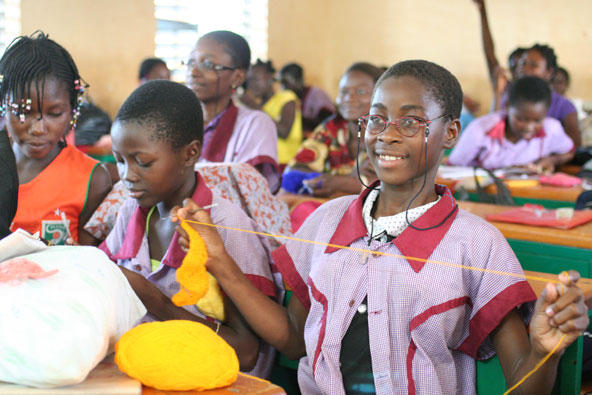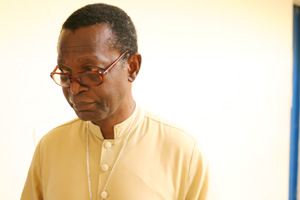
KAYA, Burkina Faso — Kaya Bishop Thomas Kaboré believes the greatest challenge facing his people is poor economic development. Drought and, consequently, famine have taken their toll on the region for years.

“The first step toward development is school,” Bishop Kaboré said. The Kaya Diocese has 15 primary schools and four secondary schools to serve a population of around a million, 10 percent of which is Catholic.
“Catholic teaching will reach the region through the parishes, but we also reach them through the schools,” the bishop said, adding that most Burkinabé elected to the government — including the Catholic president — are products of Catholic education. Most, of course, are also Muslim.
“We respect their faith. We don’t push them to change it,” Bishop Kaboré said, though he did list baptizing more Catholics as a priority. “Everything stems from the faith, the deepening of the faith. Education is deeply rooted in the faith. The rest just grows, it just happens.”
That includes Catholic Relief Services’ resiliency efforts, which focus on health, education, refugees and micro financing. “Each project is significant for us,” said Bishop Kaboré, who spent 17 years teaching in a minor seminary.
The Catholic Church is the only organization opening private schools in rural areas, according to Hervé Kone of Caritas Burkina Faso. He estimated that half of the children in the region were going to primary school.
Educated young people get jobs and earn a living, Kone said. That’s key to sustaining development.
Also, girls’ education is a specific priority for Bishop Kaboré. For example, Saint Thérèse du Lisieux School, which just celebrated its 10th anniversary, is an all-girl school with 335 students.
The bishop also founded the Université Catolique Politechnique de Kaya. The university offers two-year degrees in civil and electrical engineering and in computing. Classes are supplemented with internships. An additional agricultural emphasis is in the works.
Arsene Sawadogo, a student at the university, said he chose the school for its reputation. Teblesona Ilboudo chose it because it was Catholic.
The Italian bishops’ conference, the Diocese of Nîmes, France, and the French embassy have all supported the university. Bishop Kaboré is also working on a student foreign exchange agreement with a university in France.
“It’s better to educate students here than for them to obtain their education from a university abroad,” the bishop said. He wants to keep his educated Burkinabé in his own diocese, where they can help others.
In Niger, Niamey Archbishop Michel Christian Catatéguy also maintains a steady emphasis on Catholic education. He said the government has asked the local Church to build more schools.
“If we set up schools, we’re opening the minds of our people,” the archbishop said. That can help curb extremist ideologies, he said.
Many women now serving as ministers in the government were once students at an archdiocesan school in Niamey, which recently celebrated its 50th anniversary. The archdiocese has 14 primary schools, four high schools and is hoping to open a university.






